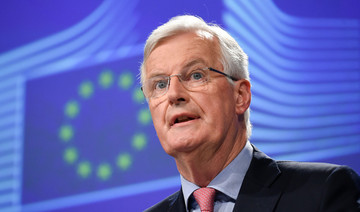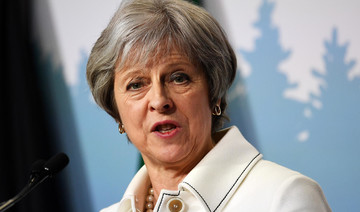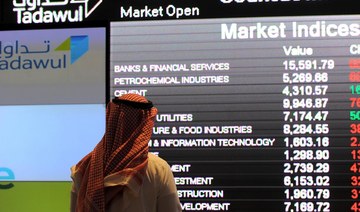LONDON: While it’s still unclear what Brexit will look like when it happens next year, the decision to leave has already had a clear effect on the economy: households are poorer, companies are more cautious about investing, and the property market has cooled.
In the two years since the vote to leave the European Union, Britain has gone from being a pace-setter among the world’s big economies to falling into the slow lane. And the uncertainty over what relations with the EU will be when Brexit becomes official on March 29, 2019 could make matters worse.
Prime Minister Theresa May’s Conservative government remains split on what those relations should be. There are those who favor a “hard Brexit,” a clean break that takes Britain out of the bloc’s free trade union but also gives it more freedom to strike new trade deals around the world. Others want to keep Britain as close as possible to the EU, Britain’s biggest trading partner, which could mean it has to obey more of the bloc’s rules.
Big companies are sounding the alarm bell, with plane making giant Airbus this week threatening to pull out of the country, where it employs 14,000, if it gets no clarity on future trade deals.
“Thousands of skilled, well-paid jobs are now on the line because of the shambolic mess the government have created over the Brexit negotiations,” said Darren Jones, the lawmaker for the community where Airbus has its plant.
Before the referendum of June 2016, the British economy had been one of the fastest-growing industrial economies for years. Now, it’s barely growing. In the first quarter of this year it expanded by just 0.1 percent from the previous three-month period, its slowest rate in about five years.
For most people, the first and most noticeable impact was the drop in the pound. The currency slid 15 percent after the vote in June 2016 to a post-1985 low of $1.21. That boosted prices by making imports and energy more expensive for consumers and companies — the rate of inflation hit a high of 3 percent late last year.
The weaker pound helped some companies: exporters and multinationals that do not sell mainly in the UK But it hurt consumer spending and businesses that depend on their shopping. The retail industry was hit hard, with high-profile companies like Toys R Us and Maplin going bust, and supermarket chain Marks and Spencer planning deep cuts.
While prices rose, wages lagged, even though unemployment is at its lowest since 1975, at 4.2 percent.
“After Brexit, prices definitely went up,” said Nagesh Balusu, manager of the Salt Whisky Bar and Dining Room in London. “We struggled a bit earlier this year, so now we’ve increased the prices.” The bar is next to Hyde Park, a popular destination for foreign visitors. “The tourists have a good exchange rate. They know they can spend a little bit more than they usually do. But the locals are coming a little less. They are starting to think about how much they spend.”
The governor of the Bank of England, Mark Carney, estimated recently that average household incomes are around 900 pounds lower than the bank was forecasting on the eve of the referendum.
The real estate market, meanwhile, has cooled considerably, with the number of property sales in London near a historic low last year, according to estate agent Foxtons.
While some foreign prospective buyers were attracted by the drop in the pound, others seem to have been scared off by uncertainty over what Brexit might mean for their investment.
House prices are stagnating after years of gains, also due to expectations that the Bank of England will keep gradually increasing interest rates.
Nic Budden, Foxton’s CEO, predicts that the real estate market will remain challenging this year, while Samuel Tombs, analyst at Pantheon Economics, predicts that house prices will flatline for the next 6 months.
Against the backdrop of uncertainty, businesses have become more reluctant to invest in big projects. Because Brexit could lead to tariffs on EU imports of British goods, companies are hesitant to spend big on British plants and office space before they know what the new rules will be.
Benoit Rochet, the deputy chief of the port of Calais, the French town across the Channel from Britain, complained to a parliamentary committee this month that “we know there is Brexit but we don’t know exactly what Brexit means.”
“You are not alone,” responded the Conservative chair of the committee, Nicky Morgan.
2 years on, Brexit vote has taken a toll on UK economy
2 years on, Brexit vote has taken a toll on UK economy
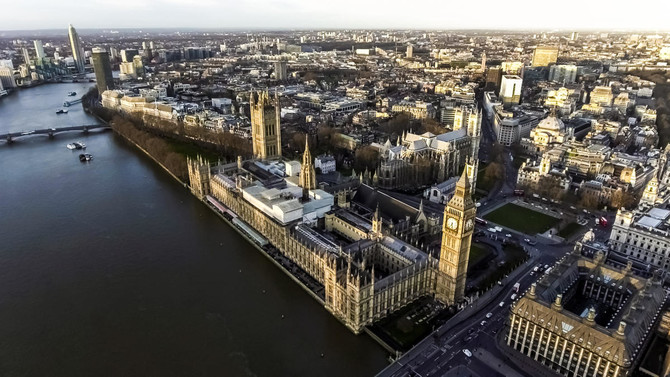
- Big companies are sounding the alarm bell, with plane making giant Airbus this week threatening to pull out of the country, where it employs 14,000, if it gets no clarity on future trade deals
- The governor of the Bank of England, Mark Carney, estimated recently that average household incomes are around 900 pounds lower than the bank was forecasting on the eve of the referendum
Saudi Rasan to offer 30% shares for IPO on Tadawul

RIYADH: Saudi-based fintech Rasan Information Technology Co. is set to offer 22.74 million shares for an initial public offering on the Kingdom’s main market.
The company, along with its subsidiaries, will list the shares, which represent 30 percent of its issued share capital, on Tadawul through the sale of 17.4 million existing ordinary shares as well as 5.3 million new ordinary shares, according to a statement.
While the existing ordinary shares account for 23 percent of the company’s issued share capital, the new ordinary shares represent 7 percent.
This comes following the Capital Market Authority’s approval in March of the fintech firm’s application for registering its share capital and offering the total number of ordinary shares, with a nominal value of SR1 ($0.27) per share.
Moreover, the offering proceeds after deducting IPO-related expenses will be distributed to the selling shareholders equally based on their shareholding in the existing ordinary shares.
The remaining proceeds are set to be distributed to the company in order to expand its current operations and products, market and develop new products, as well as finance the general purposes of the firm and its subsidiaries.
The final price of the offer shares, which account for the existing and new ordinary shares combined, will be determined by the existing shareholding and the company, in consultation with the financial advisers, following the book-building process and prior to commencement of the subscription period for individual subscribers.
The financial advisers include Saudi Fransi Capital and Morgan Stanley Saudi Arabia.
Saudi Aramco raises June’s Arab light crude price to Asia

RIYADH: Saudi Aramco raised June’s official selling price for the flagship Arab light crude it sells to Asia, according to an official statement.
Differentials for the flagship Arab Light grade were priced at Platts Dubai/DME Oman +$2.90 per barrel, up from +$2 a barrel in April.
This was the highest OSP in five months and largely in line with expectations, based on a firmer market structure and higher spot premiums last month for tradable Middle East grades such as Oman, Al Shaheen and Upper Zakum.
The higher OSPs also came after the Organization of the Petroleum Exporting Countries and its allies, known as OPEC+, maintained the first quarter round of voluntary cuts into the second quarter, while the global crunch on supplies of sour crude also underpinned Middle East grades.
Arab Medium was increased by $1 per barrel to +$2.35 per barrel, while Arab Heavy was hiked $1.10 a barrel to +$1.60 per barrel.
For Northwest Europe, the Arab Light OSP was set +$2.10 per barrel over ICE Brent futures, up from +$0.30/b while Medium was hiked from minus $0.40/b to +$1.10/b. Both grades were hiked to reflect the relative weakness in Brent compared to sour barrels.
Arab Light for April to the US Gulf was kept unchanged at +$4.75 per barrel over ASCI, while Medium was at +$5.45/b and Heavy at +$5.10/b, respectively, both slightly lower on the month.
Hong Kong, Chinese investors set eyes on Saudi market
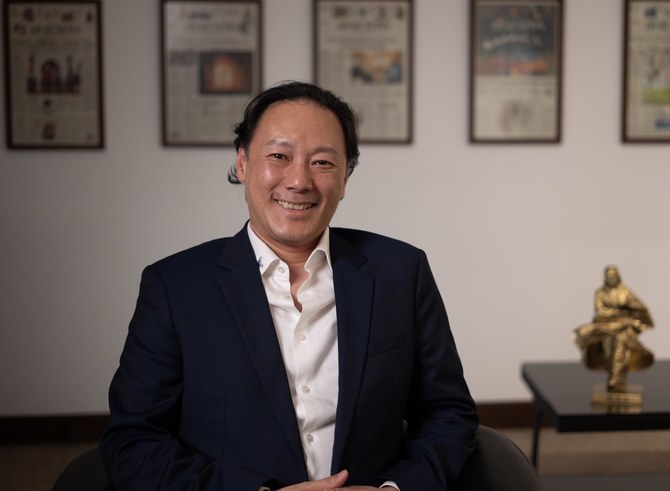
- A delegation of business leaders is set to explore diverse sectors in the Kingdom
RIYADH: Hong Kong and Chinese companies are gearing up for substantial investments in the Saudi market, marking a significant step toward strengthening economic ties, a top official said.
A delegation of 30 business leaders from Hong Kong and mainland China is set to explore diverse sectors in the Kingdom, propelled by the ambitious Vision 2030 outlined by Saudi leadership, King Leung, global head of financial services and fintech at Invest Hong Kong, said in an interview with Arab News.
Explaining the reason for his visit to Riyadh, Leung said: “I’m bringing a delegation of 30-plus executives across different disciplines to explore ways to do business in Saudi Arabia. This is not just about attracting inbound (investment), but also helping mainland Chinese companies use Hong Kong as a base to springboard to key markets like Saudi Arabia.”
Outlining the potential for co-investment between the two nations, he said: “Definitely, it’s going to be a huge number,” a sentiment that echoes the palpable excitement among Hong Kong investors who are eager to tap into the vast opportunities offered by the Saudi market.
The convergence of interests between Hong Kong and Saudi Arabia is underpinned by a notable synergy observed between businesses in both regions, the executive said, with an eye on forging strategic partnerships.
Hong Kong delegates, including private sector leaders and venture capitalists, are eager to explore avenues for collaboration that align with the objectives of Vision 2030.
“All these things that we are now finding out allow business leaders to see that some businesses from Hong Kong actually have very, very good synergy with Vision 2030 in your country.”
“It’s hard to quantify the exact number, but definitely, it’s going to be (a) huge number. I have to say these investments cut across different sectors, where you can imagine the market size is enormous,” he said, emphasizing the allure of megaprojects such as NEOM and the King Salman Park, which are set to transform the Saudi investment landscape.
These projects not only serve as magnets for investment but also catalyze growth in ancillary sectors such as financial services and consumer products, the head of financial services emphasized.
“These are megaprojects. So, all these things are going to really attract a lot of business activities, of course, initially in construction. But once you have all this construction coming in, then you need the other peripheral sectors to service them, like financial services, consumer products, and payments. So, all these things present a lot of opportunities that really get our delegates and investors from Hong Kong and China very excited,” he further explained.
Another testament to the nation’s favorable investment ecosystem is its “impressive GDP growth and low debt ratio,” factors that instill confidence among investors.
Among the sectors garnering attention are green energy and advanced manufacturing, the delegate said, affirming that Saudi Arabia is “paving the way for the future” of clean energy.
Hong Kong-based companies, armed with cutting-edge technologies, are eyeing opportunities to contribute to Saudi Arabia’s sustainable development goals.
“I understand that your country is also paving the way for the future, including adopting green energy now. So, one green energy company that I have been talking to in mainland China, they have been in the green hydrogen space for some time, and they are evaluating to put a green hydrogen factory in Saudi Arabia.”
Thus, projects such as the green hydrogen factory, poised to harness solar power for hydrogen production, exemplify this collaborative spirit.
“Now, of course, the reason why they’ve done that, part of it, is because the way they generate hydrogen is to use solar power. So they need to go to a place where this is something in abundance. Now, at the same time, you also have some highly visionary, highly capable investment vehicles from the PIF and other funds,” he noted.
Furthermore, the burgeoning fintech ecosystem in Saudi Arabia presents fertile ground for collaboration between Hong Kong and the Kingdom.
Fintech companies from Hong Kong are eager to leverage their expertise to enhance banking services and drive digital transformation initiatives in the Kingdom, the executive noted, adding, “In our delegation, we have roughly, I’ll say between 10 to a dozen or so fintech companies that are very keen to see if they can bring the business and set up in Saudi Arabia so that they’re able to service the banks here.”
On the opposite end, recognizing the potential for synergy, banks from Saudi Arabia are contemplating establishing a presence in Hong Kong to bolster their trade and financial services, he said.
This strategic move aims to capitalize on Hong Kong’s strategic position as a gateway to the Chinese market, thereby facilitating closer economic ties between Saudi Arabia and China.
“Of course, we would love to see some Saudi companies set up in Hong Kong. In fact, two of the significant meetings we had were with banks, and now these banks are interested in setting up a presence in Hong Kong,” the official said.
“This is because of the close trading relationships, and they would like to have a presence in Hong Kong to serve, for example, Chinese customers. This way, they can facilitate services like trade finance and various other services handled by the headquarters in Riyadh,” he added.
This comes after a pivotal moment in strengthening the economic ties between Hong Kong and Saudi Arabia, marked by the signing of a memorandum of understanding between Invest Hong Kong and the Ministry of Investment of Saudi Arabia last year.
As a result of this agreement, delegates from Hong Kong have been afforded unique insights into Saudi Arabia’s macroeconomic landscape, grand vision, and burgeoning investment opportunities, further fueling their enthusiasm for collaboration and investment in the Kingdom.
“Last year, our leader at Invest Hong Kong signed an MoU with MISA. That MoU brought us even closer together. They have been very kind to bring in leaders from different aspects to educate us about your country, from macroeconomic data to the grand vision from leaders in both the public and private sectors,” he said.
Leung said they also shared insights into projects that have already gained significant traction. “All in all, our delegation was super impressed by the progress made by the country,” he concluded.
Japan keen to forge partnerships with Saudi Arabia in the field of IT, says minister
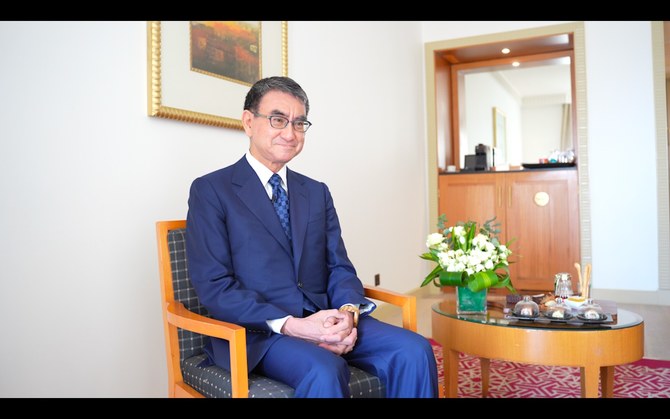
JEDDAH: Lauding Saudi Arabia’s efforts in developing giga-projects and the ongoing digital transformation in the country, a top Japanese official expressed his country’s willingness to strengthen collaboration with the Kingdom in the field of information technology.
Speaking to Arab News, Japanese Minister for Digital Transformation Taro Kono described his recent visit to one of the crown jewels of Vision 2030, NEOM, as truly remarkable.
The minister said that “he had the opportunity to fly over the project and witnessing it firsthand was truly remarkable.”
Since the launch of Vision 2030, Saudi Arabia has been in overdrive to diversify its economy away from oil and emerge as a hub of tourism, entertainment, technology, and renewable energy. On its road to transformation, the Kingdom is forging strategic partnerships with its global allies to achieve its target and work on mutually beneficial arrangements.
“I heard a lot about NEOM and The Line, I saw that the progress made was very impressive. And we heard the vision from the CEO. And it’s very convincing. So I was very glad that I came to NEOM this time. It was a very short (trip), but I think it was worth it,” the minister told Arab News.
NEOM, often referred to as the “city of the future,” is a $500-billion megacity project situated in the northwest region of Saudi Arabia. Encompassing 26,500 sq. km, the project aims to become a global leader in technology, innovation, and tourism through futuristic urban design and sustainable energy solutions.
Talking about Saudi Arabia’s demography, the minister said it is “a very young country” where the majority of the people are under the ages of 30-35. “And I see the Kingdom becoming more vibrant. And projects like NEOM” show that the country is swiftly moving forward.
Acknowledging the Kingdom’s success in adapting to the latest technologies, particularly related to cybersecurity, Kono praised the country’s leadership and its vision. He expressed his eagerness to forge a partnership with his Saudi counterpart to “learn from the Kingdom’s success.”
“I think the Kingdom is building up its resilience against any malicious attacks in cyberspace. So, I believe it is very ready to take a bold step forward. And I had a meeting with Saudi Minister of Communications and Information Technology Abdullah Al-Swaha and I think there’s a lot to learn from the Kingdom,” the Japanese minister said, adding that he had instructed his team to get in touch with their Saudi counterparts to learn from their approach.
Kono, however, stressed the need to develop non-English datasets to train artificial intelligence and proposed collaboration between Japan and Saudi Arabia in this regard.
While Japan has historically led in hardware technology, the minister admitted a lag in digital technology investment. Recognizing this gap, he signed a memorandum of cooperation with Al-Swaha to learn from Saudi Arabia’s IT advancements.
He said that although Japan excelled in analog technology during the 20th century, admittedly, they have fallen behind in investing in digital technology.
Their discussions reportedly included topics such as E-ID utilization, where Kono hopes to collaborate on developing mutual use cases to propel Japanese progress. He added: “I think the Kingdom and Japan could work together to advance in the field of IT software AI, so very much looking forward to that.”
With shared visions such as Vision 2030 and upcoming events like Expo 2025 in Osaka and Expo 2030 in Riyadh, the two countries have maintained a strong relationship for nearly seven decades.
Kono believes there is immense potential for collaboration between the two countries, particularly in joint projects for Expo 2025 in Osaka and Expo 2030 in Riyadh. “I am looking forward to continue working closely with the Kingdom,” he added.
Expo 2025 is scheduled to be held in Osaka, Japan. It will be held for 184 days This will be the third time for the Japanese city to host the event. Earlier Osaka hosted the global event in 1970 and then in 1990.
The theme for Expo 2025 is “Designing Future Society for Our Lives,” focusing on creating a better future through innovation and sustainability. The expo will provide a platform for countries to share their ideas and solutions to global challenges.
Expo 2030 is scheduled to be held in Riyadh. As the first World Expo to be hosted in the Middle East, it presents an opportunity for the region to showcase its cultural heritage, technological advancements, and vision for the future. The theme for Expo 2030 in Riyadh is “The Era of Change: Together for a Foresighted Tomorrow.” It is expected to align with Saudi Arabia’s Vision 2030 goals of diversifying the economy and promoting innovation.
Kono said: “When we had our expo in Osaka for the first time, I was probably seven or eight years old. But it gave us sort of a good, big push for the economy, or not just the economy, for society as well. Expo brings in a lot of our dreams, and dreams we had back then come true. So, this Expo 2025 will hopefully bring in another dream. And I hope it will make a bridge to 2030 and we (Saudi Arabia and Japan) can work together to make our dreams come true.”
Closing bell: Saudi main index rises to close at 12,373
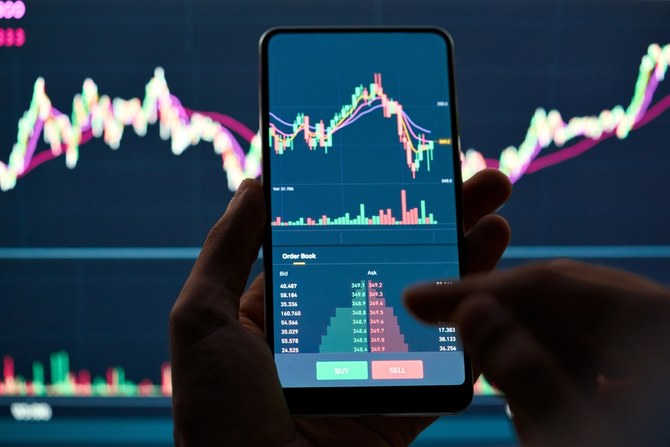
RIYADH: Saudi Arabia’s Tadawul All Share Index rose on Sunday, gaining 20.78 points, or 0.17 percent, to close at 12,373.11.
The total trading turnover of the benchmark index was SR5.26 billion ($1.4 billion) as 92 of the stocks advanced, while 129 retreated.
Similarly, the Kingdom’s parallel market Nomu also rose 332.34 points, or 1.26 percent, to close at 26,790.15. This comes as 27 of the stocks advanced, while as many as 31 retreated.
Meanwhile, the MSCI Tadawul Index jumped 4.56 points, or 0.29 percent, to close at 1,551.76.
The best-performing stock of the day was Zahrat Al Waha for Trading Co. whose share price surged 9.97 percent to SR47.45.
Other top performers include Raydan Food Co. as well as Saudi Cable Co.
The worst performer was Gulf Insurance Group whose share price dropped by 9.94 percent to SR34.90.
Other subdued performers included Al-Baha Investment and Development Co. as well as Salama Cooperative Insurance Co.
On the announcements front, Saudi Tadawul Group Holding Co. has announced its interim financial results for the period ending on March 31.
According to a Tadawul statement, the company’s net profit hit SR201.5 million in the first quarter of 2024, reflecting a 121 percent surge when compared to a similar quarter last year.
The increase was mainly driven by a rise in operating revenues, operating expenditures, and earnings per share as well as a climb in gross profit and operational profit.
Moreover, the National Agricultural Development Co. also announced its interim financial results for the first three months of 2024.
A bourse filing revealed that the firm’s net profit reached SR101.3 million by the period ending on March 31, up 168 percent in comparison to the corresponding period in 2023.
The increase in net profits is primarily attributed to a rise in revenue, a decrease in the cost of sales, and a reduction in finance costs, among other factors.
Furthermore, Gulf Insurance Group also announced its interim financial results for the first quarter of the year.
According to a Tadawul statement, the company reported a net loss of SR20.2 million, contrasting with a net profit of SR56.6 million in the same period of the previous year.
This loss is primarily attributed to a decrease in insurance revenue combined with adverse movement in reinsurance contracts.
Additionally, Saudi Aramco Base Oil Co., also known as Luberef, announced its interim financial results for the period ending on March 31.
A bourse filing revealed that the firm’s net profit stood at SR239 million at the end of the first quarter of 2024, reflecting a 46.3 percent drop when compared to the same quarter a year ago.
The decline in net profit for the current quarter compared to the same quarter of the previous year is attributed to a decrease in base oil crack margins.
Meanwhile, Saudi Cable Co. disclosed its annual financial results for the period ending on Dec. 31.
According to a Tadawul statement, the company reported a net profit of SR36.5 million in the first three months of 2024, a significant improvement from the net loss of SR584.9 million recorded in the corresponding period a year ago.


